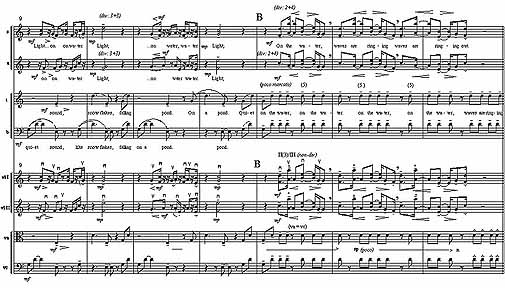Light
on Quiet Water

(fragment, Light on Quiet
Water: for mixed choir of 24 voices and small string
orchestra)
An Old/New Ideal of Sound
When music loses its relationship to dance, it loses
its sustaining and nurturing resonance with the physical body,
both of the individual performer and of the earth;
When music loses its relationship to the voice, it
loses its guiding resonance with poetry, meaning
and the more subtle realms of things spiritual.
I would very much in the future like to see New Music
performance
practice move in the direction of smaller and more flexible orchestras
and ensembles. There are many reasons for this that have to do with
the quality of the sound produced as well as the quality of musical
experience for each individual performer, but here I would like only
to give emphasis to the importance of bringing voices and instruments
back into some kind of necessary, inseparable unity.
There is nothing new in this. 270 years ago in the Western Baroque
tradition something like this flourished in the Cantata form. Also,
one
thinks of the North American Jazz tradition, especially just after World
War II. And, indeed, to this day, the Indian classical tradition has kept
an exceptionally beautiful unity between voice and instrument alive.
But in more recent times, this is—tragically, in my view—no
longer
the case with New Music in the West.
With Light on Quiet Water, my point of departure is the simple, pure
sound of the Bach Motets. These may be sung with or without instrumental
accompaniment, and in the event strings are used to reinforce the vocal
parts, they are always to play 'slightly under' the sound of the vocalists.
The sparkling sonority created thereby I encountered first as a listener
in
the early recordings of the Bach Motets made by Nikolaus
Haroncourt
and the great Concentus musicus Wien. I remain deeply indebted to
their at the time highly original approach to these masterpieces of the
German musical literature.
Next week: Another very-much more complex vocal work,
Lament, based
on an English translation of the Rilke poem.
| go to the full score of
Light
on Quiet Water | go to
Quiet Water:
Piano Score |
| back to
Picture/Poems: Central
Display | See also:
Lament,
for double choir (2 x 12 female voices)
|
| go the
Circle/Square: Table of Contents |
| go to
Circle/Square: Download for ETFs
|
from The Circle in the Square
© 2000 Cliff Crego
For more information, e-mail to
score-info@cs-music.com

